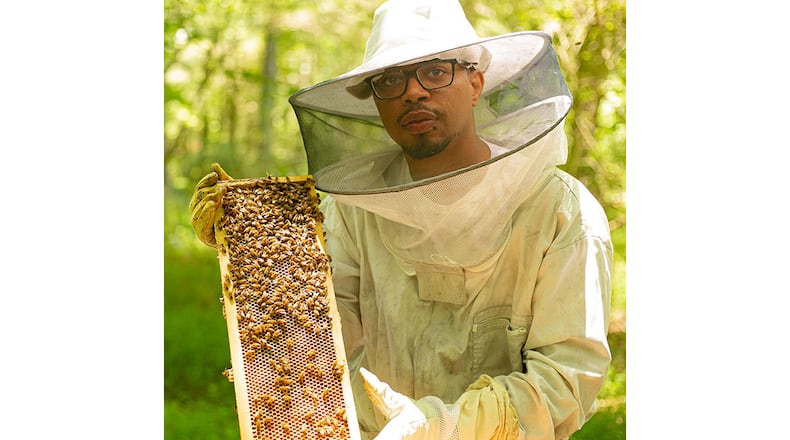Armond Wilbourn of Noble Honey Co. will spend Georgia’s coldest months making sure his 26 hives of honeybees make it through the winter.
Winter is a tough time for honeybees. They’re not out foraging for nectar and pollen, or producing honey. Depending on the temperature, they spend most of their time huddled in the hive, trying to stay warm.
“More time in the hives means a chance for pest populations to explode,” Wilbourn said. “When we get days in the 60s, I can get check the hives and treat them, to knock back the varroa mites.”
And, he’ll make sure the bees have enough honey, or a supplemental mixture of two parts sugar, one part water, to make it until early spring, when sources of nectar and pollen begin to reappear.
Credit: Handout
Credit: Handout
Wilbourn also will spend his winter selling the honey he has harvested, and expanding his offerings of honey-related products. He even is working on a honey-sweetened cold-brew coffee.
Trying the company’s wildflower honey offers the opportunity to taste the seasons, as the flavor is determined by the bees’ nectar and pollen sources. Wilbourn also sells sourwood honey, harvested from hives he takes up to North Georgia, and an orange blossom variety, from beekeepers in central Florida.
He keeps his hives in Palmetto, but he hopes to start another bee yard in Ellijay, so he can keep the bees near the source for sourwood honey.
Besides selling honey, Wilbourn’s products include hot honey, lip balms, beeswax candles and honey-sweetened lemonade. He recently released a line of creamed honeys, infused with turmeric, ginger, chocolate or lavender.
Credit: Handout
Credit: Handout
Wilbourn sells through noblehoneycompany.com, at the year-round Morningside and Marietta Square farmers markets and at the seasonal Virginia-Highland and Georgia Tech markets. “I really enjoy the people who shop at farmers markets,” he said. “It takes a lot to get up in the morning and shop with the vendors at the market, rather than just going to a grocery store to get everything you need for the week. These customers are interested in what we do, and they want to know ... about bees, about their nectar sources, and about how we harvest our honey.”
As part of the city of Atlanta’s public kiosk program, he has a two-year lease on a kiosk in front of the Georgia State University student center downtown, and another in Woodruff Park.
At the kiosks, he sells a range of his products, including cookies sweetened with honey that are baked by his wife, Brooke Kennedy-Wilborn.
Credit: Handout
Credit: Handout
“When I started as a beekeeper, I didn’t realize there weren’t a lot of people who looked like me doing this,” Wilbourn said. “Now, I take seriously the responsibility to show kids that this is something they can do, too. It’s a job and it’s rewarding, something to be proud of.”
He visits schools with a demonstration hive, and he is writing two children’s books, “The Noble Bee” and “The Noble Beekeeper.”
Wilbourn’s path to becoming a beekeeper began in Arkansas, where he was raised by a grandmother and great-grandmother. They’d eat watermelon and save the seeds to grow the next year’s crop. Losing both those matriarchs to colon cancer led him to learn that it’s one of the most preventable cancers with screening, but also by paying attention to what you eat.
“I got into growing my own food,” he said.
Wilbourn began growing watermelons in Palmetto, and, researching the best way to increase his yield, realized he needed to increase the number of pollinators. He invested in two colonies of bees, and, as he learned more about beekeeping, put the watermelons aside and concentrated on beekeeping, and starting a honey-focused business.
Looking ahead, he wants to create new uses for honey and beeswax, get his products into Atlanta-area stores and expand his presence in e-commerce.
Sign up for the AJC Food and Dining Newsletter
Read more stories like this by liking Atlanta Restaurant Scene on Facebook, following @ATLDiningNews on Twitter and @ajcdining on Instagram.
About the Author



